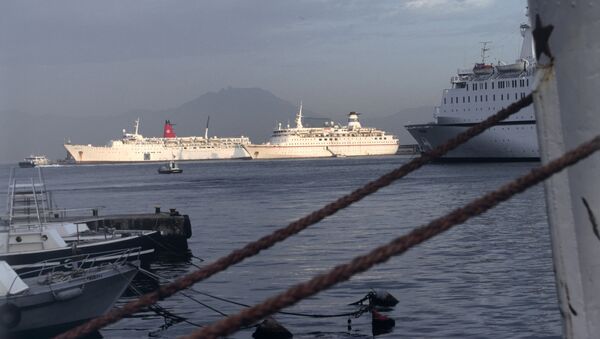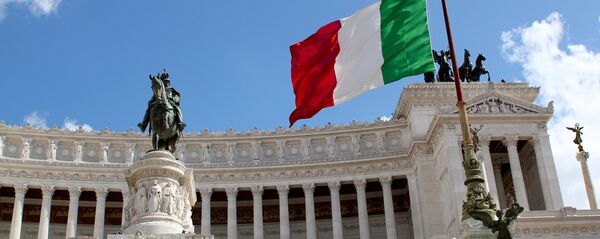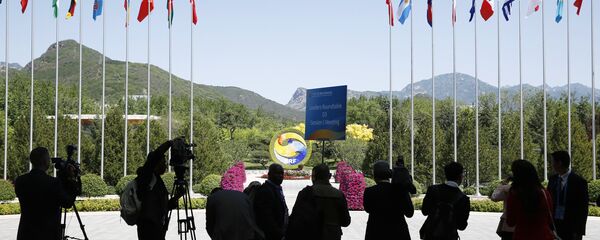"Yes, that’s the good project, it’s exactly what we do, it’s sacral. Genoa is the gate of entry to all of West Europe", Bucci said, asked if the port of Genoa is going to become a gateway for Chinese products to Europe.
The mayor went on to note that the Italian ports would play a crucial role in the project, allowing shorter shipping routes and thereby accelerating the movement of goods.
"Trieste is the gate of entry for East Europe. Italy is the best part for the Silk Road. Because ships coming from the Suez Canal will arrive to Trieste and Genoa much sooner than going to Rotterdam or Antwerp. They are going to save at least five days, and that makes a lot of sense", he continued, adding that such an alliance is "absolutely" beneficial economically.
He specified that the roadmap was yet to be finalized, suggesting that it might take place in late April-early May and adding that "there is an intention to have a collaboration" with China Communications Construction Company.
READ MORE: Italy Officially Becomes First G7 Country to Join China's Belt and Road Project
With a view to agreeing on the roadmap, the mayor plans to meet again with Chinese businessmen and officials in April-May. Bucci, however, is still undecided if he is going to attend the Second Belt and Road Forum in Beijing in April, which Prime Minister Giuseppe Conte is set to attend.
"My feeling is very good. I think we are doing a good job with them [China], they are very happy about what we are doing. In my life I have been working a lot with the Chinese people, beginning from 2004, that was my first trip to China. I know how to deal with them, and then it was very successful", Bucci added.
Commenting on concerns regarding possible aggressive competition between the local and Chinese technological companies, which has recently been in the spotlight in Italy, the mayor said that he did not share them.
"It’s not my concern. I think our technology and our know-how has a lot of value, and that's the reason why we are very competitive on the market. We will keep our technology and make sure our technology is part of the package we offer to everybody else", Bucci said.
The mayor, however, stressed that it was up to tenders to decide who is "going to be the best".
READ MORE: Italy's Plan to Join BRI Aims to Build Multiple Asia-Europe Gateways
On Saturday, Italy joined the BRI project, signing a memorandum of understanding during the visit of Chinese President Xi Jinping to Rome. The country became the first G7 nation to endorse the Beijing-promoted ambitious infrastructure and development investment plan, triggering frustration of Brussels and Washington. Under the memorandum, most of the Chinese investments are expected to be allocated for the development of the strategic ports of Genoa and Trieste.
Plans to ‘Introduce City to World’ at SPIEF With Help of Cuisine, Theater
The 23rd edition of SPIEF will be held on 6–8 June. Bucci, who is also the extraordinary commissioner for the reconstruction of sadly remembered Morandi bridge, is going to travel with a team of some 10 people to the forum to make a presentation of the city, which is known as the heart of the picturesque Italian Riviera and the birthplace of pesto sauce.
"We are going to introduce Genoa to the world. We are going to have our theatre, Carlo Felice Theater and orchestra, making a performance one night there in St. Petersburg. We are also going to have three special star-prize cooks preparing Genoese delicacies there – pesto and everything, for 800 people. So it’s going to be tough, but we will make it", Bucci said.
According to Bucci, "there will be some very important meetings with people that are interested in investing in Genoa, and about having tourists coming from Russia to Genoa".
READ MORE: Chinese Belt and Road Plan Shouldn't Become Political Tool — Italy's Lega
The mayor specified that he already had meetings scheduled on the SPIEF sidelines with Russian officials, but would not like to disclose with whom exactly.
Having the background of a business manager, Bucci aims to attract foreign investments in the city and maximize its potential as an international strategically important logistics hub.
"The city of Genoa is going to be developing in three different areas: port logistics, touristic area, and hi-tech. I am looking for investors in those three areas. Because this is what we can do here better than any other place in the world", he clarified.
Meanwhile, March 26 marked the return to Genoa of cruises operated by Costa Crociere line after 15 years of hiatus, seen as another boost for the city's tourist potential. One of its ships, Costa Fortuna, entered the port on Tuesday, with the mayor and president of the Liguria region, Giovanni Toti, attending a special ceremony.
"It’s a big deal. Welcome back home! From the touristic standpoint, we are going to have 300,000 cruise people arriving in Genoa and leaving from Genoa. We are going to have a new dock for Costa. And Costa already has here the headquarters, so we have more than 800 employees here in the city. Every single cruise passenger is statistically spending about 80 euro in the city where they stop. So make your calculation", Bucci said.
Asked if he expected an increase in arrivals of Russian tourists, the mayor said "definitely."
The city authorities are planning to organize city centre tours, special theatre and opera performances and even museum exhibitions only for the passengers of cruise liners.
New Genoa Bridge in Place of Collapsed Morandi Overpass to Open by April 2020
A new road viaduct in the northern Italian city of Genoa to replace the Morandi bridge, sadly remembered for last year’s deadly collapse, will become fully operational by April 2020, Marco Bucci, the city’s mayor and the extraordinary commissioner for the reconstruction, told Sputnik in an interview.
In August, a 210-metre (690-foot) section of the Morandi bridge, the main road for the Genoese to Milan, collapsed during a storm, killing 43 people. The investigation into the tragedy is still underway. Motorway operator Autostrade per l'Italia was responsible for maintenance.
READ MORE: Italy: President Xi & the Silk Road
"The reconstruction – we already started with the pre-work. I think in the beginning of April we will start with the full steam ahead. The demolition will end at the end of July. And we are planning to have at the end of December the full bridge up. Then we will have at least three months or a little bit more for checking, registration for the roads and everything else. So I am planning to open up the new bridge for everybody around the middle of April 2020, one year from now", Bucci said.
Meanwhile, the absence of the bridge passage causes a lot of inconvenience for local people, leaving some areas inaccessible. Some parts of the bridge have already been removed, but the most difficult work of removing the bridge pillars is still ahead. They were supposed to be exploded, but Ligurian regional environmental agency ARPAL has expressed concern over the presence of asbestos in the concrete of the bridge and possible environmental damage.
"We are on plan for demolition and reconstruction. They found the traces of asbestos, but it's typical of the cement that we have here because it is in the mountains. And it’s lower than any kind of threshold. So we just need to have more precaution and take more precaution during the demolition activities. The explosion, I think, will be done on the column number 10 and column number 11. I don't think there is any other way to do it right now because they are 95 meters high, and it’s very risky to have people over there cutting the bridge with the diamond mask. It’s very difficult", Bucci said.
Chinese investors will not be involved in the new bridge construction, he added, since all the relevant contracts have already been signed.





